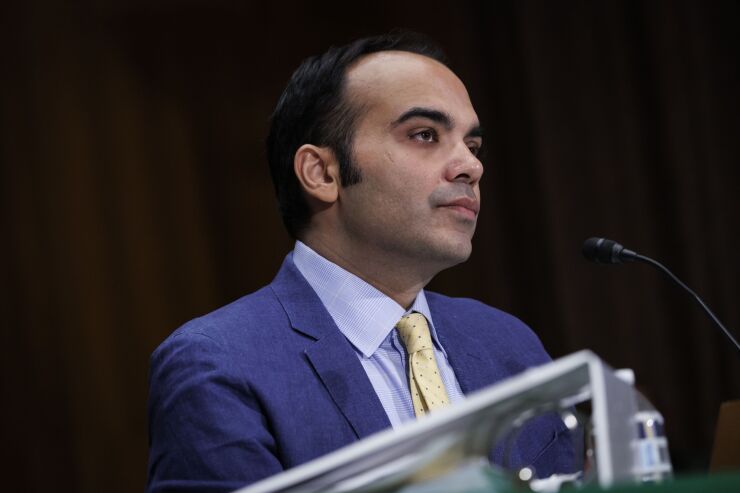Want unlimited access to top ideas and insights?
2024 has come and gone, leaving behind three successive interest-rate cuts from the Federal Reserve, a suite of newly implemented regulations drawing contempt from bankers and the return of Donald Trump to the White House. These changes and many others have many wondering what 2025 will hold for banking.
Recent weeks have seen a wave of top federal regulators announce their departures from office in advance of Trump's Jan. 20 inauguration, including
Barr will retain his membership on the Fed's board of governors, which includes leading its internal committee on supervision and regulation until his successor is announced. Fed Gov. Michelle Bowman, one of two appointees remaining at the central bank from Trump's first term, is a top contender to succeed Barr.
"It's got to be Gov. Bowman or Gov. Waller, if [Trump] wants a Republican," David Zaring, a professor of legal studies and business ethics at the University of Pennsylvania's Wharton School, told American Banker's
Read more:
Unlike Thompson and Barr,
In addition to putting many key regulatory figures in flux, 2024 saw the ever-contentious trend of credit union purchases of banks hit a record high.
American Banker calculations based on S&P Global data found that the 22 credit union-bank mergers announced last year — an all-time record — amounted to roughly 20% of deal activity across the industry for the year.
"ICBA and community bankers continue calling for Congress to hold hearings and to consider an 'exit fee' on credit union acquisitions of tax-paying banks to capture lost tax revenue resulting from these deals," Rebeca Romero Rainey, president and CEO of the Independent Community Bankers of America, said in a
Read more:
Learn more about the top issues kicking off 2025 below, ranging from lawsuits challenging the CFPB final rule on excluding medical debt from credit-score calculations to one Montana bank's loan challenges.

First Interstate's $49.3 million answer to a problematic loan
First Interstate Bancsystem in Billings, Montana, recorded a $49.3 million partial chargeoff in its loan to an unnamed distribution company this month, signaling the end of what was one of the largest — and most problematic — loans for the bank.
According to First Interstate's
First Interstate maintained a $26.5 million reserve especially for this loan, as of Sept. 30, 2024, and said it plans to allocate more funding to cover the remainder of the loan. Share prices dropped by 3.7% following the announcement.
Read more:

FDIC's potential new leader touts regulation cuts, crypto engagement
Reducing the regulatory burden currently facing banks, creating a more welcoming environment for engaging with digital assets and pulling back from climate-focused requirements — all of these are top priorities for Federal Deposit Insurance Corp. Vice Chair Travis Hill if appointed to the lead role at the agency.
One such weight is the future of the Basel III endgame
"Using both the point in time capital framework and the SCB to address these deep tail risks will make some of these activities uneconomical for banks to engage in, and as a result damage financial market functioning," Hill said.
Read more:

Fed rate pause likely following healthy job report
Despite a relatively steady unemployment rate of 4.1% in December, more than 256,000 nonfarm jobs were added alongside positive employment trends in health care, government, social assistance and retail, according to the
But following the results of the jobs report, predictions that Federal Reserve's "entering a new phase" of monetary policymaking will mean working to keep rates steady. "We are at or near a point at which it will be appropriate to slow the pace of further adjustments," Jerome Powell, chairman of the Federal Reserve, said during a post-meeting press conference last month.
Read more:

Debt collectors go after CFPB rule excluding medical fees
The debt collection agency trade group ACA international and Specialized Collections Systems, a Houston-based debt collector, have
Both parties claim the CFPB's rule is based off "outdated data from a poorly constructed study" and that the original notice of proposed rulemaking failed to include the agency's justification for the final rule, thereby excluding it from any comments.
This is the second such lawsuit filed against the CFPB since the final rule was issued on Jan. 7. The first was filed by the
Read more:

CFPB rules, OCC M&A standards on regulatory chopping block
As President-elect Donald Trump readies himself for a second term in office, he and other members of his administration wielding the Congressional Review Act of 1996 will step into a regulatory environment overseen by Republican control of all three major branches of government.
This dynamic will afford Trump a greater degree of success in undoing many controversial policies across the banking industry, including the CFPB rules on
"Republicans control both chambers of Congress, which gives them the power to pass CRA resolutions on a partisan basis by a simple majority vote," Jon Skladany, partner at Jenner & Block, told American Banker's
Read more:




